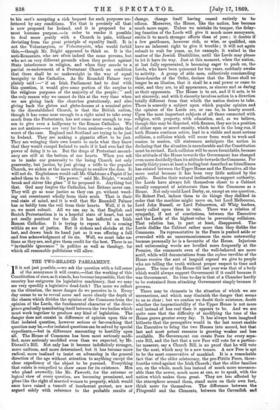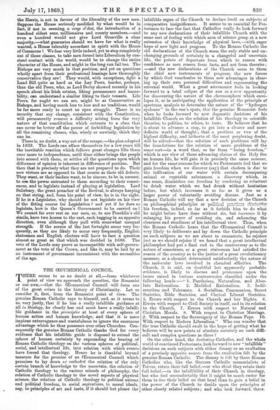THE TWO-HEADED PARLIAMENT.
TS it not just possible,—we ask the question with a full sense J. of the annoyance it will create,—that the working of this Constitution of ours, as it stands, has become impossible, that the country has outgrown its legislative machinery, that we may see very speedily a legislative dead-lock I The more we reflect on the situation, the more danger do we perceive in it. Every day seems to us to reveal more and more clearly the depth of the chasm which divides the opinion of the Commons from the opinion of the Lords, the fundamental character of the diver- gence gradually manifesting itself between the two bodies which must work together to produce any kind of legislation. The danger does not consist in difference of opinion upon this or that isolated question, however serious or far-reaching that question may be,—for isolated questions can be solved by special expedients,—but in difference amounting to hostility upon all. The House of Commons has been most seriously modi- fied, more seriously modified even than we expected, by Mr. Disraeli's Bill. Not only has it become indefinitely stronger, more uniform, and more determined, but it has become more radical, more inelined to insist on advancing in the general direction of the age without attention to anything except the clear expediency of the object to be pursued. Everything that exists is compelled to show cause for its existence. Men who plead avowedly, like Mr. Fawcett, for the extreme or logical view of every question, are becoming prominent, and pleas like the right of married women to property, which would once have raised a tumult of incoherent protest, are now argued solely with reference to the probable results of change, change itself having ceased entirely to be odious. Moreover, the House, like the nation, has become much more eager. Unless we mistake its temper, the delay- ing function of the Lords will give it much more annoyance, excite it to much stronger efforts than of yore ; it doubts if a few gentlemen, however rich, or wise, or qualified, cam have an inherent right to give it trouble ; it will not again submit to wait for years, as, for example, it waited in the- matter of the Jewish Disabilities, until the Lords may please to let it have its way. Just at this moment, when the nation, at last fully represented, is becoming eager to push on, the Lords, who have been quiescent for ten years, suddenly awake- to activity. A group of able men, collectively commanding three-fourths of the Order, declare that the House shall no- longer be an illusion, that it shall be a real power or cease to exist, and they are, to all appearance, as sincere and as daring as their opponents. The House is to act, and if it acts, is to act sincerely, and with it sincerity involves action in a direction totally different from that which the nation desires to take. There is scarcely a subject upon which popular opinion and the opinion of the Lords are, or can be, in hearty accord- Upon the most important subjects of all those connected with religion, with property, with education, and, as we believe, though this may be disputed, with finance, they are in a position of either open or secret enmity, which must in the long run, if' both Houses continue active, lead to a visible and most serious- collision, a collision which will recur from week to week and session to session, till statesmen anticipate the nation in declaring that the situation is unendurable and the Constitution must be revised. Each collision will be more formidable, because- the attitude of the House towards the Government has changed even more decidedlythan its attitude towards the Commons. For nearly thirtyyears at least a feelingbest described as friendliness- has existed between the Upper House and the Executive, all the more useful because it has been very little noticed by the public. Besides their natural inclination to support authority, the Lords have always felt themselves closer to a Cabinet usually composed of aristocrats than to the Commons as a House. Not only could Lord Derby, or, except on one question,. Sir Robert Peel, induce them to do things they disliked in, order that the machine might move on, but Lord Melbourne, Lord John Russell, or Lord Palmerston, all Whig leadera, rarely called upon them in vain. There was a relation of sympathy, if not of convictions, between the Executive" and the Lords of the highest value in preventing collisions. That relation has, in part at least, disappeared. The Lords dislike the Cabinet rather more than they dislike the' Commons. Its representative in the Peers is pushed aside or overruled with an unceremoniousness the more noteworthy because personally he is a favourite of the House. Injurious. and unbecoming words are levelled more frequently at the Premier, the comments even of the well-behaved are more acrid, while wild denunciations from the enfans terrales of the House receive the sort of languid reproof we give to people who are telling the truth without proper respect to time and place. The tone of the House till last year was that of a body which would always support Government if it could because it was Government. Its tone to-day is that of a Chamber hardly to be restrained from attacking Government simply because it governs. There may be elements in the situation of which we are- unconscious, and which may diminish the danger that seems- to us so clear ; but we confess we doubt their existence, doubt whether the impracticability of the Upper House is not more real instead of less real than it appears to be. And we are quite sure that the difficulty of modifying the tone of the House grows greater every day. It has always been imagined hitherto that the prerogative would in the last resort enable the Executive to bring the two Houses into accord, but that last and most potent resource is growing weaker and less. available. No Government can create Peers for every sepa- rate Bill, and the fact that a new Peer will vote for a particu- lar measure, say a Church Bill, is no proof that he will vote- for the next, which may be a new tenure. A new Peer is apt to be the most conservative of mankind. It is a remarkable fact that of the older aristocracy, the pre-Pittite Peers, three- fourths voted against the Irish Church; that the older families are, on the whole, much less instead of much more unreason- able than the newer, much more at one, so to speak, with the nation which makes them great. They are less affected by the atmosphere around them, stand more on their own feet, think more for themselves. The difference between the Fitzgerald and the Clements, between the Cavendish and the Harris, is not in favour of the liberality of the new men. Suppose the House seriously modified by what would be in fact, if not in seeming, a coup d'etat, the introduction of a hundred eldest sons, millionaires and county members,—and even a hundred would not give Lord Granville a clear majority,—what guarantee should we have for what is really wanted, a House tolerably accordant in spirit with the House of Commons ? We fear very little indeed, yet to step completely out of those classes, to take men forced into Liberalism by con- stant contact with the world, would be to change the entire character of the House, and might in the long run fail too. The Bishops are very much in that position, and yet on questions wholly apart from their professional leanings how thoroughly conservative they are I They would, with exceptions, fight a Land Bill quite as hard as the Lay Peers, harder, perhaps, than the old Peers, who, as Lord Derby showed recently in his speech about his Irish estates, liking permanence and immo- bility, can understand a similar liking to their tenants. Life Peers, for aught we can see, might be as Conservative as Bishops, and having much less to lose and no traditions, would be far more ready to court an open struggle. There is no security that any change, consistent with the Constitution, will permanently remove a difficulty arising from the very nature of that constitution which entrusts to a class that can never be better off the power of forbidding legislation by all the remaining classes, who, wisely or unwisely, think they can be.
There is, no doubt, a way out of the scrape,—the plan adopted in 1832. The Lords can efface themselves for a few years till the inevitable reaction which follows great changes lifts them once more to independence, until time either brings the people into accord with them, or settles all the questions upon which difference of opinion is inherent in difference of position. But then that is precisely what they are not prepared to do. Their new virtues are as opposed to that course as their old defects. They want, or their leaders want, to be sincere, to be in earnest, to use the power entrusted to them according to their consci- ences, and to legislate instead of playing at legislation. Lord Salisbury, the great preacher of the Revival, is always harping on that string, and, from his point of view, he is in the right. If he is a Legislator, why should he not legislate on his view of the fitting course for Legislation ? and yet if he does so legislate, how is the Queen's Government to be carried on ? We cannot for ever rest on our oars, or, to use Franklin's old simile, have two horses to the cart, each tugging in an opposite direction, even although they pull with somewhat unequal strength. If the scenes of the last fortnight occur very fre- quently, as they are likely to occur very frequently, English statesmen and English electors will have to face a question almost as great as that which was decided in 1688. The veto of the Lords may prove as incompatible with self-govern- ment as the veto of the Crown, and like it, may be laid by as an instrument of government inconsistent with the necessities of the age.































 Previous page
Previous page